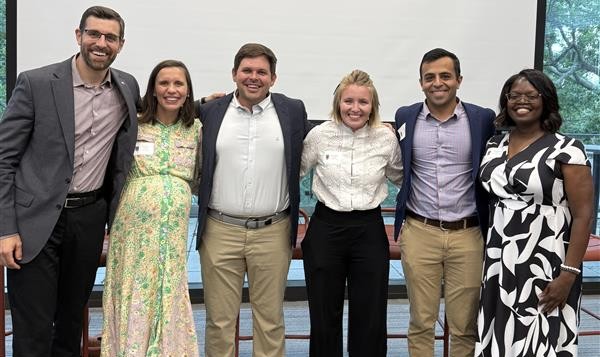Your Personal Brand in the Workplace
Everyone has a personal brand — whether they realize it or not. How you show up at work, interact with others, and contribute to your organization all reflect your brand. It’s a blend of your values, strengths, skills, attitude, appearance, communication style, and those unique qualities that set you apart. Just as importantly, your brand is shaped by how others perceive you. In the workplace, perception often becomes reality.
This summer, DAR hosted a panel featuring colleagues at various stages of their careers to explore what it means to build and maintain a personal brand. Their insights touched on everything from networking and mentorship to managing teams and cultivating a professional presence online.
Whether you’re just starting out or looking to refine your brand, their perspectives offer valuable guidance. Keep reading to discover practical strategies that can help you build — and own — your personal brand in the workplace.
Professionalism is not a box to check; it’s a mindset and continuous practice. As Kyle Tschepikow wisely shared, “There’s never a point in time where we arrive as professionals. It is an ongoing journey.”
Professionalism Is a Practice
Professional growth begins with a simple but powerful question: “How can I get better?” Embracing this mindset enables us to continually improve and evolve in our roles. It’s essential to regularly seek input from your supervisors, managers, and peers. Their perspectives can uncover blind spots and offer new strategies for growth. Don’t wait for formal evaluations; development is most effective when it’s ongoing and proactive.
Networking
Everyone has a network; the key is understanding its effectiveness. Think of your network as a system: people who help you succeed, people who need you to succeed, and those who work alongside you to solve problems and innovate. Building authentic relationships in the workplace fosters a sense of community and support, which in turn increases your effectiveness.
Networking helps:
- Solve problems by offering new perspectives
- Spark innovation through external exposure
- Strengthen your connection to your organization and mission
- Advance your career by increasing your visibility when opportunities arise
Appearance & Presentation
You only get one chance to make a first impression. Appearance, office space, and overall presentation play a critical role in how you are perceived. As Brittany Rider said, “Perception, for better or for worse, is really important in our role.”
Consider:
Dress for Your Day: Align your attire with your calendar. For example, meeting donors or external partners may require a more formal presentation. When in doubt, err on the side of overdressing.
- Workspace: Keep your workstation organized and professional. What’s on display in your office speaks volumes about your approach to work.
- Self-awareness: Ask yourself, “How am I showing up today?” Whether in appearance, attitude, or communication, you are always representing your brand.
Refer to UGA’s Dress for Your Day policy for helpful guidelines.
Communication: Clear, Concise, and Contextual
Communication is more than sending a message; it’s about how that message is received. As Vince Thomas stated, “When you are communicating on behalf of the University of Georgia, you want to be clear, concise, and mindful of your mode of communication.”
Tips for effective communication:
- Be intentional with your tone
- Tailor your communication style for internal vs. external audiences
- Understand urgency and choose the right platform: Teams chat, email, text, or phone call
Social Media Presence: Digital Professionalism
Your online presence matters. As Courtney Ayers emphasized, “We are ambassadors of the university.” What you post, like, and share reflects not only on you but also on your organization.
Best Practices:
- Keep personal and professional accounts distinct
- On LinkedIn, share content from trusted UGA sources, highlight donor stories, or celebrate team achievements
- Maintain a level of neutrality as a state employee
- Be mindful of your audience: “Would I want my supervisor to see this?”
Adaptability and Ownership
Being adaptable isn’t just about how you adjust to new conditions; it’s also about how you react when things don’t go as planned. As Umesh Patel shared, “How you react to any situation is a part of your brand.”
Key Practices:
- Stay adaptable in the face of change
- Communicate transparently when priorities shift
- Focus on solutions, not just problems
- Know when to recognize that “there is no way to see something through to completion right away.”
Being a reliable, adaptable teammate is a hallmark of strong leadership. Remember, change takes time, and adaptability is a measure of strength.
Difficult Conversations: Radical Candor in Action
Tough conversations with supervisors or peers don’t have to be scary. Radical Candor is about caring personally while challenging directly. The sooner you bring up a concern, the sooner you can address it.
Tips for productive conversations:
- Be transparent and honest
- Come prepared with potential solutions and ideas
- Ask: “How can I better support you?” or “What do you need from me?”
- Stay open to feedback and apply it to grow in the workplace continually
As Brittany Rider noted, “All of the supervisors in DAR want to help you solve your problems. Be solution-oriented and bring them in on the front end.”
Refer to the Radical Candor Ted Talk for more information.
Mentorship: Guiding Growth
Mentorship can accelerate your growth both personally and professionally. Courtney Ayers encourages everyone to find a mentor in each space; someone who’s a few steps ahead, willing to share their insights, and shows up in ways that you want to.
The UGA Mentor Program is an excellent way to connect with experienced professionals and UGA alums.
Managing Up: Partnering With Your Manager
Managing up is about building a strong and productive relationship with your manager. As Kyle Tschepikow said, “We can encounter limits in our own effectiveness when we do not have a strong working relationship with our boss.”
Keys to Managing Up:
- Understand their communication preferences
- Routinely ask: “What can I do to help you?” or “How can I be more effective in my role?”
- Don’t let problems be surprises, bring them solutions early
- Value their time, come prepared with context and options
A strong manager-employee relationship enables you to make a bigger impact and unlock new opportunities.
Navigating Gossip & Rumors
Rumors and gossip are toxic to a healthy workplace. They create mistrust, damage reputations, and can spread quickly. While it may be tempting to engage, choose instead to foster trust and respect.
When gossip arises:
- Refrain from participating
- Address it directly if appropriate
- Bring concerns to leadership in a constructive way
- Focus on facts and solutions, not speculation
A strong culture focuses on leadership, collaboration, and impact.
Final Thoughts
Professionalism is a daily decision. From your appearance and communication to your adaptability and relationships, every action contributes to building your brand. Ask questions. Listen closely. Understand the details. Surround yourself with people who challenge and support you. And above all — DARe to level up!
Watch the Level Up and Learn, “Your Personal Brand in the Workplace,” panel discussion.

Panelists: Brittany Rider, Chief of Staff, Courtney Ayers, Associate Director of Parent Giving, Kyle Tschepikow, Senior Director for Business Engagement and Career Connections, Umesh Patel, Director of Career Development and Programs, Vince Thomas, Associate Regional Director of Development
Moderator: Michelle Carter, Senior Director of Talent Management





